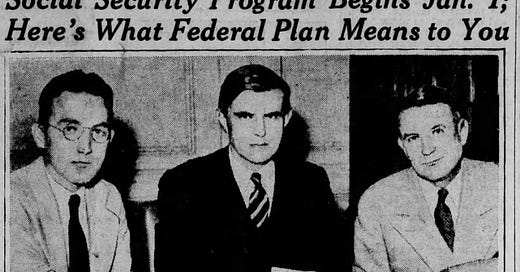Professor Hamilton's Diary: Dec. 15, 1935
They overslept; details of new Social Security plan revealed
All the activities and socializing on Saturday must have been too much for the Hamilton family. They overslept and missed both Sunday school and church. Mary Elizabeth had an upset stomach. “Home and inside most of the day,” the professor concluded his short diary entry.
On January 1, 1936 the first phase of the Social Security program approved by Congress during the summer would go into effect. A series of articles in the Reading Times provided by a wire service told Reading residents what to expect.
Having grown up when Social Security was a widely focused entitlement program for aged and disabled people, I was surprised to learn about its original narrow focus.
Paid subscribers can read on. Click below to upgrade.
Professor Hamilton’s diary being blank on Dec. 16 and 17, I will begin on those days sharing with paid subscribers what happened to him and his family after his diary ended on Dec. 31, 1935. But only paid subscribers can read this. Give yourself an early Christmas gift and sign up today for just $5 a month or $50 a year. That way you will also be ready to enjoy the diaries of Mrs. Ross, a Washington, D.C. matron writing about the early days of World War II in 1942; Walter E. Askew, chief of police in Newnan, Ga. in 1930; and Myra Jackson, a young farm wife and mother living in Petrey, Alabama in 1932. For various reasons, these diaries are incomplete, but each provides fascinating insights into America during those turbulent years. Thank you for reading and supporting my efforts!
The photo of the three members of the Social Security board appeared on the front page of the Reading Times on Dec. 16, 1935. Chairman John G. Winant, in the center, was a Republican. He later served as ambassador to Great Britain during World War II.
Keep reading with a 7-day free trial
Subscribe to Baptists, Bootleggers, and Everything in Between to keep reading this post and get 7 days of free access to the full post archives.




